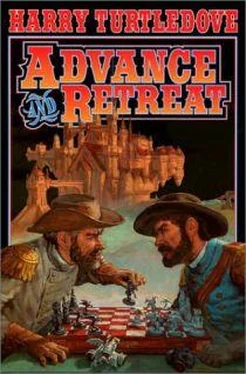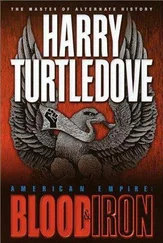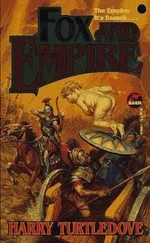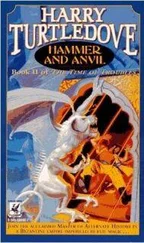Bell had asked him a question. He needed a moment to remember that, and then to answer: “I want to know where we’re going, sir, and what we’re going to do about the southrons now that they’ve holed up in Poor Richard.”
No matter how bad Bell looked, he hadn’t lost the urge to fight. “We’re going to hit them, that’s what,” he said. “We’re going to hit them, and we’re going to rout them, and then we’re going on to take Ramblerton. It must be done, and so it will be done.”
“Yes, sir,” Ned said. Bell was right-taking Ramblerton was something the northern cause desperately needed. Ned went on, “I’ve ordered Colonel Biffle, one of my regimental commanders, to lead the unicorn-riders across the Trumpeteth so we’ll be ready to hit the southrons that good hard lick you want just as soon as we can.”
“Have you?” Bell raised an eyebrow in surprise, like a lion thinking it might have scented prey. “Without waiting for orders or permission from me?”
“Yes, sir,” Ned of the Forest said again. His voice warned that he was another lion, not a lumbering buffalo. “They’re my men. I reckon I can tell ’em what to do without a by-your-leave from anybody, especially when it comes to putting them closer to the enemy.”
He waited to see how Lieutenant General Bell would take that. Bell started to cloud up, then checked himself and nodded. “All right. I will not complain of any man who wants to close with the southrons. That compares well with the miserable cowards commanding my crossbowmen and pikemen. They had a golden chance, a chance sent by the gods, to strike John the Lister a deadly blow, and did they take it? Did they? No! They sat inert, the spineless wretches, and let this magnificent opportunity dribble through their palsied fingers.”
Carefully, Ned said, “Sir, there’s a difference between things going wrong because somebody’s a coward and things going wrong just on account of they go wrong, if you know what I mean.”
“I know what you mean, which doesn’t mean I think you’re right,” Bell replied. “Wouldn’t you have attacked the gods-damned southrons if they were marching across your front? Of course you would have-you make a proper man. Those fools, poltroons, brigadiers… But I repeat myself.”
“When we get to Poor Richard, sir, it won’t be that bad,” Ned predicted.
“By the Thunderer’s holy foreskin, it had better not be.” Bell sounded very much like an angry lion.
“You’ll see.” Ned of the Forest spoke with all the confidence he could muster. He would, in due course, be proved right, if not in precisely the way he meant when speaking to Lieutenant General Bell.
Bell waved the words aside with a motion of his good hand. “Anything further to report, Lieutenant General? The southrons continue to flee before us, having even less spirit than my own brigade and wing commanders, and your men are crossing the Trumpeteth, which is actually not bad news.” By his scowl, he never expected to hear anything but bad news ever again. “Nothing more? Very well, then. You may rejoin your riders, and my congratulations for the spirit they-and you-have shown.”
“Thank you, sir.” Ned saluted and left the pavilion. His strides were lithe, pantherlike. He didn’t care to think about the crutches leaning close by Bell’s chair. Bell would never advance at anything but a caterpillar’s hitching crawl. No, Ned didn’t want to think about that. He’d already suffered several wounds. One instant of bad luck and he’d be no better off than the commanding general.
If everybody thought about those things, who’d go and mix it up? he wondered. How would you, how could you, fight a war?
He saw no answer, not at first. But as he swung up onto his unicorn-one more thing Bell would never do unless someone tied him to the saddle-he realized the answer was that most men didn’t think about such things. He didn’t want to think about them himself, as he’d just proved, and he was as far from a coward as any man breathing. He shrugged and scowled and went on riding.
When he got down to the Trumpeteth, he found only a rear guard of his unicorn-riders still on the northern bank. The rest had crossed over with their animals on a motley little fleet of rowboats and rafts. Ned piled into a boat with the ordinary riders he commanded. They chivvied his unicorn aboard a raft, although the great white shining beast didn’t like the journey at all. Once on the southern bank of the Trumpeteth, Ned had to gentle the unicorn down again before it would deign to bear his weight.
“You know how to handle ’em, Lord Ned,” a trooper said admiringly.
“I ought to.” Ned of the Forest was not sentimental about unicorns, or about anything else that had to do with battle. “I’ve had enough of them killed out from under me.”
“That’s on account of you always head for where the fighting’s hottest,” the soldier said.
“I’m going to tell you a secret about how to be a general,” Ned said. “Do you want to hear it?”
“Yes, sir !” The trooper leaned forward. If he could have pricked his ears ahead like a unicorn, he would have done that, too.
“All right, then. Here it is: if you want to be a general, you have to want to go where things are the hottest, and you have to make your men want to follow you. If you can manage that, you’ll do all right.”
“Lord Ned, sir, you make a hells of a general,” the soldier said.
“Thank you kindly.” Ned’s smile was a little less carnivorous than usual. He liked praise, and being called Lord Ned. Unlike most of the officers who fought for King Geoffrey, he was no noble. He’d made a good living before the war as a serfcatcher. A lot of blond serfs ran away from the land and liege lord to whom they were bound, and Ned had more than a little genius for poking through the jungles and woods and swamps where they liked to hide and bringing them back. That was how he’d come to be known as Ned of the Forest.
But serfcatching, while it might bring money, didn’t bring respect. Thraxton the Braggart wasn’t the only officer who looked down his nose at Ned for his work and his low birth. Most of the scornful ones, though, had learned to keep their mouths shut. For one thing, Ned had proved an even better commander of unicorn-riders than he was a serfcatcher. And, for another, he’d made it plain he had no qualms about killing men supposedly on his own side who were rash enough to insult him.
He booted his unicorn into motion. It was a big, sturdy beast. It needed to be, to carry a man with his big, sturdy frame. He brought it up to a fast trot.
Unicorn-riders waved as he went past. He waved back, or sometimes lifted the broad-brimmed felt hat from his head for a moment to greet the troopers. That made them wave even more, and cheer, too.
Before too long, he caught up with Colonel Biffle at the head of the column. “What’s the word, sir?” Biffle asked.
“Well, Biff, I’ll tell you,” Ned answered. “When the whole army gets down to Poor Richard, the stinking southrons had better look out for themselves.”
“All right.” But Biffle frowned. “That won’t be an easy position to crack, not if John the Lister digs in like he can.”
“Bell thinks we can lick ’em. Even more to the point, Bell thinks we should’ve licked ’em at Summer Mountain,” Ned said. “Somebody’s going to pay on account of we didn’t.”
“Somebody’s going to pay, all right,” Colonel Biffle agreed gloomily. “I tell you, Lord Ned, if we go at ’em at Poor Richard, it’s liable to be us.”
“We’ve got to do some fighting. Bell’s dead right about that,” Ned said. “John the Lister won’t disappear if we don’t. Neither will Doubting George, down in Ramblerton. We went into this war talking about what a bunch of cowards the stinking southrons were. Well, by now we know that isn’t so. If we want to shift ’em, we’ll have to shift ’em. You know what I mean?”
Читать дальше












